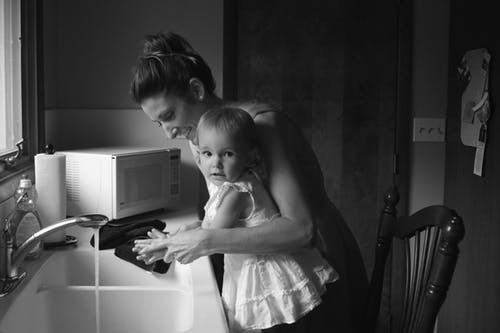How to Talk to Your Child About Coronavirus (COVID-19)
By Tracy Hart, LCMHC

The spread of coronavirus (also called COVID-19) has caused disruptions in the daily routine of many families, including the closure of schools and workplaces. You may be wondering how to talk with your children about this situation and support them in coping with the changes.
The following suggestions are based on advice from counselors, as well as the Centers for Disease Control and Prevention (CDC) and the National Association of School Psychologists (NASP). A list of coronavirus resources is included below.
Provide Accurate Information about the Coronavirus
It’s important to be honest with children in an age-appropriate way. For preschoolers and early elementary school kids, keep the information brief and simple. Reassure them that adults are working hard to keep kids safe and that they can play an important part by washing their hands correctly. There are many examples of fun handwashing songs on YouTube, including this brief animated video on handwashing produced by the CDC: https://www.youtube.com/watch?v=kHPQrYthn6M
Older kids and middle schoolers are likely to have specific questions about what may happen next, and they may have heard myths or rumors about the virus. You can respond to their questions honestly and explore their concerns together. For any questions you’re not able to answer, be sure to research online at reputable sites such as Johns Hopkins University, the World Health Organization, or the CDC.
Although older kids are able to discuss complex information about COVID-19, they may need reassurance about what is being done to reduce the impact of the virus on your community. Be sure to emphasize that handwashing is the single most vital role everyone can play in preventing the spread of the virus. Both kids and teens can have fun creating posters with favorite song lyrics using the handwashing infographic generator at Wash Your Lyrics: https://washyourlyrics.com
Make Space for Big Feelings
Most of us have not experienced this degree of disruption to our daily routines of school, work, and social or sports activities. Let kids know that it’s okay to feel scared, sad, worried, or nervous about what’s happening. They may share that things feel uncomfortable, surreal, or “weird.” It’s also normal for kids or teens of any age to seem annoyed or irritable under these circumstances. Encourage them to find ways to express their emotions, whether by talking to someone they trust or by using art, writing, movement, or music to release big feelings.
What Parents Can Do to Help Kids Feel Safe During COVID-19
- Help your child identify sensory comforts that help them feel calm and happy, such as a favorite blanket, a familiar song or video, or hiding inside a blanket fort.
- If your child seems worried or scared, you can help them use physical ways to calm their nervous system, such as the Bee Breath video on YouTube: https://www.youtube.com/watch?v=0WnJbdEoKhE
- In this time of heightened emotions, try to seek a balance between work and fun. The main goals can be maintaining a consistent routine and finding ways to connect with each other, as well as virtual ways to “visit” with friends and family outside the home.
- Maintain your usual house rules, but acknowledge that everyone may find it challenging to stay on their best behavior right now.
Above all, remember that this experience is temporary. Families who keep the focus on connection and kindness can make the most of this time together.
For more helpful information and tips, visit AuthoraCare’s resources for kids page.
List of Coronavirus Resources for Kids and Their Families
- Article about the coronavirus comic for kids, including links to the comic in Spanish and other languages: https://www.npr.org/sections/goatsandsoda/2020/03/07/811616161/kids-around-the-world-are-reading-nprs-coronavirus-comic
- Bee Breath video on YouTube: https://www.youtube.com/watch?v=0WnJbdEoKhE
- Handwashing video for young children, produced by the CDC: https://www.youtube.com/watch?v=kHPQrYthn6M
- Make a handwashing poster featuring your favorite song lyrics: WashYourLyrics.com
- Parent handout in PDF format from the National Association of School Psychologists (NASP), available in English, Spanish, and other languages: https://www.nasponline.org/resources-and-publications/resources-and-podcasts/school-climate-safety-and-crisis/health-crisis-resources/talking-to-children-about-covid-19-(coronavirus)-a-parent-resource
- The CDC’s guide for talking with children about COVID-19: https://www.cdc.gov/coronavirus/2019-ncov/community/schools-childcare/talking-with-children.html

